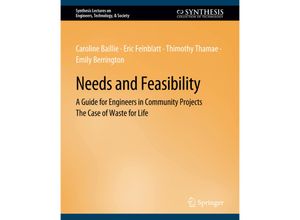Needs and Feasibility: A Guide for Engineers in Community Projects -- The Case of Waste for
Life is the story of Waste for Life (WFL). WFL is a not-for-profit organization that works to
promote poverty-reducing solutions to environmental problems and its educational branch is an
international consortium of universities in six countries involving students in support of
community development projects. WFL currently works in Lesotho and Argentina. We present the
story of the development of WFL in each country as a case-based guide to engineers professors
and students interested in community development work particularly in contexts very different
from their own. We focus mainly on the set-up stages framing the projects to ensure that
community needs are adequately articulated and acted upon. We begin with needs assessment what
is it that needs to be done -- for whom and why? How feasible is this technically
economically and can we guarantee sustainability? Before we can decide any of this we need to
understand and map the territory -- who are the key players who have the most influence and
who will be most impacted by what we are doing? What is the role of the local government? If
the groups are working as cooperatives what does this mean and what are these groups looking
for? What is the technical solution going to look like? If it is a product how will it be
marketed? What other social environmental and economic impacts will it have and on whom? Once
these have all been negotiated and it is clear that all parties are working towards a mutually
acceptable goal how do we move forward so that any dependence on external partners is removed?
When do we bring students into the work? What role can they play? Should they stay at home and
support the project from there or is it better to do work in the field? This guide will be
useful for the student engineer or the experienced engineer or professor who is interested in
moving towards socially just engineering development work but has no idea where to begin. The
real difficulties and on the ground issues encountered by the Waste for Life team are presented
honestly and with the knowledge that we must learn from our mistakes. Only then can we hope to
gain a better understanding of our potential role in supporting community development and move
towards a better future. Table of Contents: An Introduction Assessing the Need in Lesotho
Feasibility of WFL Lesotho Mapping the Territory in Buenos Aires Stakeholder Focus: The
Local Government Stakeholder Focus: Cooperatives Sustainability: Economic Environmental
and Social Student Involvement Summary Thoughts

